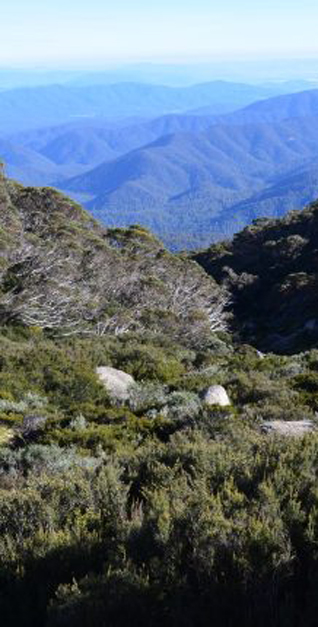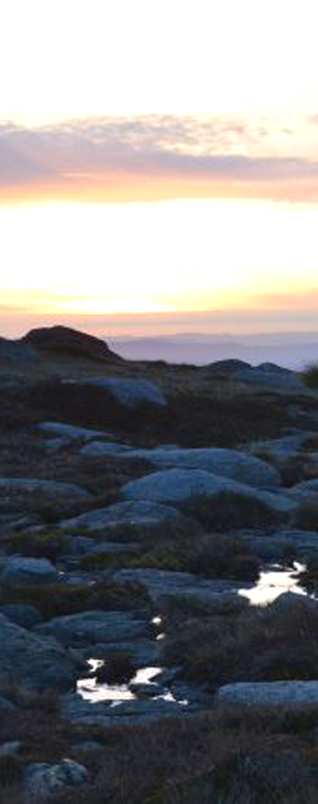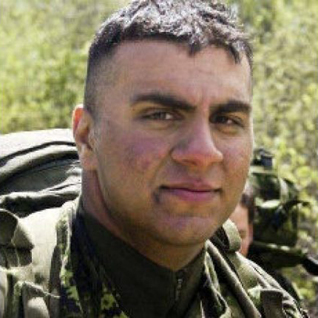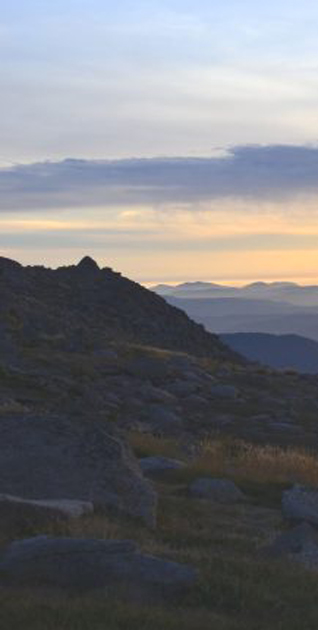Sports
Lost in The Australian Wilderness:
Sikh-Canadian Hiker Prabhdeep Singh Srawn
RICKY FRENCH
A year after his disappearance, an obsessed hiker tracks the last steps Prabhdeep Singh Srawn took in Australia’s Snowy Mountains. And many of the clues are pointing in one direction.
Charlotte Pass, New South Wales, Australia
One year ago, in May 2013, a 25-year-old Sikh-Canadian hiker from Brampton, Ontario, named Prabhdeep Singh Srawn vanished off the face of the earth.
Narrowing it down, you might say he vanished off the face of Mount Townsend, in Australia’s Snowy Mountains.
Narrowing it down is a difficult thing to do in the baffling case of Prabh Singh. So little is known of Prabh’s movements, intentions and supplies, and so lacking are the clues, that piecing together his final steps and resting place has become a game of guesswork and supposition.
It has become one of Australia’s greatest ever outdoors mysteries.
* * * * *
Prabh was living and studying on Australia’s beach metropolis of the Gold Coast. A year ago he left the sun and surf for a touring holiday, intending to finish in Melbourne, 1,700 kilometres away.
He never got there.
Only two things are known for sure: 1) he hired a van and drove it to Charlotte Pass; and 2) he never brought it back. He also never told anyone of his hiking plans.
Astonishingly, the first sign Prabh was missing came when the van wasn’t returned.
Prabh’s family, savagely critical of the decision by New South Wales Police to call off the search after less than two weeks, has continued to fund private searches. Led by his cousin, Raj, and sister, Mandeep, they flew to the Snowy Mountains and set up a base to organize search parties. They eventually made the heartbreaking decision to leave, but returned in November with a Canadian search-and-rescue team.
It was hoped the snow melt would reveal Prabh’s body, or even a miracle. Nothing was found.
The long distance has meant Prabh’s family has relied on local help. A Sydney man named Dave Jarvis has been one of the main Australian searchers over the last year, putting in many weeks.
I contact Jarvis and he gives me some information. He thinks he knows where Prabh’s body is. He says, “I’ve got quite a story to tell.”
* * * * *
I meet Jarvis in the mountain town of Jindabyne. We are staying in a house belonging to another Canadian, a woman named Shawn Joynt, who has opened her doors to private search parties ever since she heard a fellow Canuck was missing.
Sometimes furtive, sometimes open, Jarvis is naturally suspicious; a loner but also a craver of company: a craver of ears to hear his stories. There’s intensity to everything he says and does.
“I’ve sat here and watched Prabh’s mother cry every day,” he says. “Yep. I’ve got some stories to tell.” I am introduced to 59-year-old Peter Effler, from Melbourne. The two men pitch their theory.
“All we have to go on are two clues,” says Jarvis. “Mobile phone pings and dog alerts. Both point to the Western Fall.”
The Western Fall Wilderness is a steep, tangled mess of bush, rocks and creeks that drops down to the west of the main Snowy Mountains range. It’s wild and rarely ventured into. Jarvis taps his finger on the map. “That’s where we’re going.”
I learn that the men have singled out the Western Fall as the most likely area to find Prabh based partly on analysis of his mobile phone “pings” and partly on the barks of a dog. Effler’s dog Jochen is one of the most highly trained and successful search-and-rescue dogs in Australia, and accompanied searchers into the Western Fall late last year.
Jochen was silent for days, then made a series of barks, or “alerts,” that signalled he was picking up a human scent. A sudden blizzard then forced the party to abandon the search. We would be going back to that spot.
* * * * *
Prabh wasn’t the only person leaving Charlotte Pass for a late autumn hike on May 14, 2013. Four friends, led by Tom Batty, set out to complete the same loop that Prabh was intending to do, just a couple of hours after the Canadian. As well as taking proper clothing and provisions, they took a video camera.
From the footage the full extent of the blizzard is revealed. The men start walking in fine conditions, but by the early afternoon snow is driving into their faces, and a freezing wind is whipping up the valley. Sticking to the Main Range Track, the party takes shelter in Seaman’s Hut, the lone refuge on the tops, and waits out the storm until the next day. They saw no sign of Prabh. How close they came to him we may never know.
* * * * *
Saturday sees the crowds flock to the Snowy Mountains. We make an odd sight amongst the hundreds of day-walkers strolling up to the summit of Mount Kosciuszko, the country’s highest peak. For the most part the landscape around Australia’s highest mountains is almost comically flat and benign. There is no significant challenge in completing a loop round the popular features, ending back at the car park.
A laptop found in Prabh’s van (a possibly vital clue, overlooked by police in their search of the van) reveals he extensively researched Mount Townsend, Australia’s second highest mountain.
It’s easy to see Mount Townsend’s attraction: it’s a much more challenging climb for a young, confident army reservist. It’s also considerably off the main track. Prabh wasn’t carrying a sleeping bag or a tent: both were found at his home. His sister, Mandeep, told me she had never known him to hike overnight, and that his rental car was due back in Melbourne the next day. Whatever he was planning to do, he was planning to do it in one day.
* * * * *
We break off the popular Main Range Track near Muellers Peak. The mood changes immediately. The well-formed track disappears, replaced by indistinct rock-markers, called cairns, that guide you up to a broad saddle between Mount Townsend and Alice Rawson Peak. A sense of isolation immediately hits you, like you’ve just stepped outside of a loud party and into the silent street. There are no hordes of people, no wide tracks. Just a barren saddle, lonely rocks and Mount Townsend. To climb the mountain Prabh would have had to come to this saddle. But did he climb?
Certain boxes would need to be ticked for him to decide to climb. He might be cold, but not so cold that he would think himself in danger. He would not be injured at this point. The weather might be bad, but not so bad as to threaten danger. He would be confident that after returning from the summit he would be able to continue his hike safely back to the main track and out of the park. Only if these boxes were ticked would he climb.
I think he climbed.
Prabh wouldn’t have seen anything from the summit, only thick cloud and falling snow. Objective reached, he would focus on descending and getting back to the Main Range Track.
He would never get there.
* * * * *
Jarvis works out he’s spent over 80 days searching. Prabh’s family famously offered financial inducements to willing volunteers during the private search phase in winter. A stipend of $250 per day was on offer, as well as a grand prize of $100,000 should Prabh be found, dead or alive.
I ask Jarvis what sort of people this brought to the hills.
“Some good ones,” he says, “but also some rubbish ones.”
He describes a man who appeared to have trouble making out obvious landmarks. When asked if he could see OK, the man replied that no, he couldn’t, as he had broken his glasses the previous week.
“This clown was meant to be searching, looking for small clues,” says Jarvis. “We dragged him around, effectively blind, for 10 days, then he happily pockets $2,500 and goes on his merry way. He was just a uni student looking for a quick cash injection.”
Was Jarvis raking it in then? “S--- no!” he says. “I’ve accepted a small amount of money for travel costs, but as far as this stipend business goes, forget about it. I’ve lost a load of money. I’m doing this for his mother, and because Prabh’s my brother. He’s a fellow hiker, yeah? That means he’s my brother.”
* * * * *
Effler holds his GPS. “The dog alert zone is one and a half kilometres in this direction,” he says, wagging a finger into the Western Fall wilderness. It was also in this direction perhaps the most important clues were revealed: mobile phone pings.
According to tower analysis they could have only come from the Western Fall. The pings are received between 1:30 p.m. and 3 p.m. After that his phone goes silent. For some inexplicable reason, Prabh moved into the Western Fall and never made it out.
We were trying to make the inexplicable explainable. We needed to get Prabh into the Western Fall. Why would he descend from Mount Townsend then make his way into the steep bush, into the biting wind, away from Charlotte Pass and his van, into the unknown?
The reason could be that he had a fall climbing down from the summit. Heading down off the boulders, Prabh could easily have slipped and twisted an ankle, or worse. He would instantly be in a life-threatening situation. Alone, without a tent, sleeping bag or extra clothes, he would have to act fast. It would be a journey of nearly eight kilometres on the exposed tops through a blizzard to Seaman’s Hut, where the Batty party were huddled round a fire.
We’re hiking in autumn, three weeks earlier in the year than Prabh. It’s a relatively balmy 14 C under sunny skies, but at night our water bottles freeze as the temperature plummets to minus-4.
He may have been too injured to risk an arduous trek through a blizzard on the tops, but he may have been able to limp downhill into the tree line. It seems a plausible theory, and one that fits what few tangible clues we have.
If he had attempted to walk out via the Main Range Track and perished there, his body would have been found: the summer thaw would have revealed it. In clear weather it’s easy to thoroughly search the entire region, with its gently undulating, treeless landscape. As far as we can be certain about anything in this case, we can be certain he’s not there.
So if Prabh is not up, he surely must be down.
* * * * *
An early clue during the initial search last winter seemed to confirm this. A plastic water bottle was found on a track called Hannels Spur, a tough, overgrown route through the Western Fall, which Jarvis describes as the worst track in Australia. It connects the Main Range with the Geehi Flats -- a popular campground -- in a valley to the west.
Finding the water bottle appeared to be a huge breakthrough. The bottle was from an underwater diving company called Pro Dive Cairns. A quick check revealed that Prabh had been diving in the popular North Queensland resort town of Cairns the previous December.
Hopes soared that this would lead searchers to Prabh, possibly still alive in the bush.
It didn’t. Further investigation revealed it wasn’t the same diving company Prabh had used. Also, the spot on Hannels Track where the bottle was found is very close to Geehi Flats, the Alpine Way road and Doctor Forbes Hut. On the doorstep of civilization. If he had made it this far he would effectively be home free.
Except for one thing: he would have to cross the flooded Swampy Plains River, probably exhausted and hypothermic. The mystery of the water bottle remains one of the biggest conundrums of the case.
* * * * *
We drop into the gully. Laid out before us are endlessly repeating layers of dark green hills, building upon each other all the way to the horizon. In the foreground is the Geehi Flats campground. It looks almost within shouting distance, but it’s actually more than seven kilometres away, through the toughest country you could find anywhere.
Donning full protective gear, we half fall through the vegetation, compressing the canopies with our weight until the branches reach maximum flexing point, where they either support our weight or snap. It’s like pushing through quicksand. In two hours we progress only 300 metres.
Ever so slowly a clump of trees which Effler tells me is the “alert zone” comes into view. It’s time to make camp. At night the lights from cars on the Alpine Way and campers at Geehi Flats look tantalizingly close.
Was it a fatal deception for Prabh?
* * * * *
I wake in the morning to find Jarvis and Effler studying the GPS. Jarvis points down to a bend in the creek.
“You see that big rock? Up on that ridge is the alert zone. And down there in the creek -- that’s our search area. That’s where I expect to find him.”
We pick our way down the creek, lowering ourselves over rocks, pushing through trees and undergrowth, feeling every step with our feet before deciding if it’s safe to put weight down. We have frequent stops to gather our breath and thoughts.
“He’s just got himself into a situation he wasn’t prepared for,” Jarvis says. He goes quiet for a moment, and stares down into the Western Fall. “I’m coming, Prabh,” he says, intently, “I’m coming, brother.”
We start climbing to the alert zone. It takes every bit of strength to muster a step against gravity and against the barrage of trees. We are only a few metres apart from each other but always out of sight.
“Have ya got a whistle?” shouts Jarvis.
“No,” I shout back.
“You need a whistle,” Jarvis continues. “If you fall and break your jaw you can’t shout. At least with a whistle you can shove it up your nose and blow.”
“Thanks,” I call back, pushing aside a mass of unyielding sticks wrapped around my face. “I’ll remember that.”
We’re supposed to be searching as we go, but it’s a full-time job just to go. We finally haul ourselves upon a small clearing, totally exhausted. Effler sits silently for a while, breathing heavily.
“You’re overheating,” says Jarvis, and we help him remove two layers of clothing. Jarvis looks around at the unending trees and wilderness. For the first time he sounds doubtful, frustrated.
“I don’t know how much longer I can keep coming back here. This is taking me to the limit, you know? All this searching. Nothing. Nothing whatsoever. No clothing, no sign.”
I sip some water and join Jarvis in contemplating the situation. It would be pure chance if we found Prabh here. We would have to literally stumble over his body. He could be lying two metres to the side of us and we wouldn’t know.
Jarvis takes a deep breath, pulls his jacket tight and pulls himself together.
“C’mon, gents, let’s make our way back down to the creek, spreading out as we go. That’s where I fully expect we’ll find him.”
* * * * *
Jarvis bends down and picks up an animal dropping. “Probably a wild dog,” he says. He breaks the small, cylindrical dropping in half and studies it. He predicts my question.
“I’m looking for signs of protein. Any sign it may have been feeding on Prabh.”
Later, he expresses reservations about drinking the creek water.
“Prabh may be polluting it,” he explains.
Jarvis saw Prabh wherever he looked. He saw him in every broken branch (“This was broken by someone else, not us”) and in every sturdy tree. (“This would have been a good place to get out of the wind; to try to start a fire.”) He saw the world through Prabh’s eyes. His life flashed back and forth continually between the present day and May 14, 2013.
* * * * *
We fight our way back to the creek. It dawns on us the folly of even attempting to search the bush up the sides of the creek. At least in the creek progress was possible, just.
I tell Jarvis I’m going to follow the creek all the way back up to our campsite, searching as I go. I tell him there’s no point in even trying to penetrate the surrounding banks and bushes. I tell him I’m going to climb back to the saddle and camp on the tops, then walk out in the morning.
He looks at me like he was expecting to hear that news. He’s used to people bailing early. He gives me a send-off speech.
“Just remember, no one’s come down here before. No one’s searched this area yet. It’s too tough. The police wouldn’t come here, no one would.”
“What are you two going to do now?” I ask.
Effler is battered, bleeding slightly from a cut just above his eye. His gaiters are ripped apart. “I think,” he says, “I think we come down here tomorrow and search up and down a little bit more on the sides of the creek.”
“Ok,” Jarvis nods. “We’ll do it. We’ll do just a little bit more.”
* * * * *
I’m back up under Mount Townsend in a little over an hour, choosing a camping spot just under the saddle.
The alpine grass is soft and fluffy and the view from my tent flap looks over to Mount Kosciuszko. At sunset I walk over the saddle and gaze into the Western Fall, over all the layers of hills upon hills that stretch to the horizon. Ancient rocks are bathed in warm orange light as the sun melts into the low clouds. It seems ridiculous that this spot had been the scene of howling gales, snow, blizzard, and a wandering soul wandering to his death, freezing, consumed in an instant by violent, rampant nature.
I sit on a smooth rock, an entire continent laid out below me.
There is no wind.
No sound.
No sign of anything that shouldn’t be there.
[Courtesy: The Toronto Star. Edited for sikhchic.com]
June 8, 2014
Conversation about this article
1: Sunny Grewal (Abbotsford, British Columbia, Canada), June 08, 2014, 1:56 PM.
I remember hearing about this story last year. I hope his family gets the closure that they are looking for. When studying abroad, we should all be very careful and take every precaution possible. Even if this means sending texts home every other hour on a regular basis and making sure to tell your family when you are headed out, even if it is to go out and get grocery. This is especially important for young women who are studying abroad alone. We should also remember that although we are far away from home and the freedom is refreshing, we have duties and obligations to keep our parents informed of our whereabouts. I hope that Prabh's family finds what they are looking for soon.
2: Gurpreet Singh Badwal (Sydney, Australia ), June 10, 2014, 9:19 PM.
Just like many others volunteers, a bunch of us from Sydney went down to face the unknown and tough terrain to help with the search and provide langar, logistics, resources and. most importantly, moral support to Prabh's family right after three weeks of Prabh's missing news came to our knowledge. Unfortunately, nothing really helped. We even met a guy who had read Prabh's news in Sydney's newspapers and had a dream about him which compelled him to join the search. It was an unexplainable situation back at the hotel, days were going by and chances of finding Prabh were getting slim and Prabh's parent eagerly waiting for all of us to come back each night with some kind of positive news. Volunteers, police and others hikers were getting worn out and we were nowhere near finding any clues. Some of the areas we wanted to search were as tough as described in the article; we did not even dare to proceed and decided not to put our lives in danger. Unexpectedly, people from different backgrounds and different parts of the world came together on their own expense, took leave from work, sustained injuries, lost personal equipment, etc., during the search, only to help find Prabh and most of them didn't even know Prabh. I think this search left a scar on most of our lives and made us believe 'always expect the unexpected'. I pray Waheguru ji everyday gives strength to Prabh's family to face the unbearable loss of their loved one.






